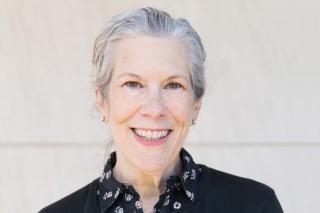How long have you been with Simmons? Tell us about your current role.
I’ve been at Simmons since 2001, teaching in English, women’s and gender studies, the honors program, and the graduate programs in children’s literature and gender and cultural studies. I’ve served as chair of both the Department of English and the Department of Women’s & Gender Studies, and I’ve directed the graduate program in gender and cultural studies.
I’m currently the Interim Dean of the Undergraduate Program. One of the very best parts of this position (which I love) is overseeing the general education program, PLAN (Purpose, Leadership, ActioN).
How would you describe PLAN to prospective students?
PLAN is Simmons’ general education program. While just about every college has a Gen Ed program (it’s a crucial part of a liberal arts education, designed to make you a well-rounded student, with knowledge in something besides your major), PLAN not only fulfills the traditional purposes of Gen Ed, but it also gives Simmons graduates the skills and the knowledge to contribute to their communities in meaningful and sustainable ways. PLAN teaches Simmons students to communicate clearly and impactfully and to practice what our President, Lynn Perry Wooten, calls “everyday leadership.”
How does PLAN differ from other institutions' curriculum?
PLAN is different in four key ways:
- it’s customizable, not one-size-fits-all, with up to 20 different, individually designed sections of the three signature courses offered each year, each section created by a faculty member based on their specific expertise and interest;
- it’s grounded in high-impact practices—active learning practices that promote deep learning by promoting student engagement—the kinds of learning experiences that many colleges offer but very few make available to all students. These experiences (writing-intensive courses, collaborative assignments and projects, undergraduate research, first-year seminars, and service learning, for example) are built into PLAN, not as extras, but as the basis of Simmons’ approach to Gen Ed;
- it focuses on the skills employers emphasize they’re looking for;
- it’s centered on diversity, equity, and inclusion.
Each and every PLAN course is exhilarating and challenging and serious intellectual fun.
What do you hope students take away from their experience in PLAN?
I know Simmons students will experience collaborative learning, global learning, integrative and interdisciplinary experiences, a commitment to diversity, equity, and inclusion, and community-based learning, with an emphasis on writing, leadership, and undergraduate research in their PLAN courses.
I hope they’ll take away confidence in their ability to communicate and to collaborate, to lead and to work as part of a team, and to think critically, both within their field of expertise and across fields.
How does PLAN prepare students professionally?
It focuses on the skills employers emphasize they’re looking for:
- the ability to communicate clearly, both verbally and in written form;
- to lead effectively and to work productively as part of a team;
- to think critically, both within their field of expertise and across fields, to integrate and synthesize and analyze, in other words.
If you could take any PLAN course, what would it be and why?
I can’t possibly choose one! PLAN classes are taught by some of our very best faculty from throughout the University who care enormously about their students and what they’re teaching — and that’s saying something at Simmons, where we all pride ourselves on our excellence in teaching and our dedication to our students. Each and every PLAN course is exhilarating and challenging and serious intellectual fun.
Here’s what I can say: I’d look forward to taking any (and every) section of the Boston Course because I’d get to know the City of Boston (and my classmates) via field trips and community projects and service learning and because I’d get writing instruction that demystifies the process of writing and gives me confidence in my ability to communicate in written form.
I’d look forward to taking The Leadership Course because it would give me a chance to put into practice President Wooten’s 5 Everyday Leadership Practices, to learn how to work effectively as part of a group (and life is full of group work, I’d tell my college-self), and to become a more self-assured public speaker.
And in a Learning Community, I’d look forward to developing my skills as an integrative thinker. I’d be excited about the opportunity to see and practice the habits of mind and intellectual methods of two different disciplines and to experience professors from two different disciplines team-teach a course they designed around a problem or issue or subject they’re both passionate about. I’d also look forward to taking the three classes that constitute a Learning Community with the same group of students, building an intellectual community around the subject of the Learning Community and bonding over that intense experience.

